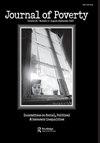纳米比亚贫困的社会经济影响:温得和克三个非正规住区的案例研究
IF 0.9
Q3 SOCIAL WORK
引用次数: 0
摘要
本文章由计算机程序翻译,如有差异,请以英文原文为准。
The Socio-Economic Impact of Poverty in Namibia: The Case Study of Three Informal Settlements in Windhoek
求助全文
通过发布文献求助,成功后即可免费获取论文全文。
去求助
来源期刊

Journal of Poverty
SOCIAL WORK-
CiteScore
2.60
自引率
10.00%
发文量
26
期刊介绍:
The Journal of Poverty is the first refereed journal to recognize the inequalities in our social, political, and economic structures, presenting progressing strategies that expand society"s increasingly narrow notions of poverty and inequality. The journal"s broad understanding of poverty—more inclusive than the traditional view—keeps the focus on people"s need for education, employment, safe and affordable housing, nutrition, and adequate medical care, and on interventions that range from direct practice to community organization to social policy analysis. The journal"s articles will increase your knowledge and awareness of oppressive forces such as racism, sexism, classism, and homophobia that contribute to the maintenance of poverty and inequality.
 求助内容:
求助内容: 应助结果提醒方式:
应助结果提醒方式:


